
How to Localize Your App in Hebrew & Arabic?
We’re happy to announce that Arabic and Hebrew are available on AppTweak! This means that you can now find all the best keywords for your app and be the first to localize your ASO in the Middle East.
Arabic and Hebrew now on the App Store
As you may have heard recently, Apple will be soon releasing these two new languages for product page localization. Till now, the App Store was only available in English for Middle East countries, making it difficult for apps to offer an app page that was appealing for those who were not comfortable in English. To overcome this limitation, many local apps were showing a default-English product page that included both English and Hebrew/Arabic copy. The problem with this hack was that it was only possible if your app was very local and you didn’t really care about other English-speaking countries. However, global apps did not have this opportunity to (at least partially) localize on Apple. On the Google Play Store, Arabic and Hebrew have been available for quite some time now.
Boost your downloads with app store localization
With the arrival of new supported languages on iOS 13, we decided to review our set of available languages to make sure we are aligned with the stores. You’ll now be able to follow apps in Hebrew and Arabic on both the App Store and Google Play.
Be among the first to localize your app (on iOS)
App localization is the most powerful weapon to drive organic downloads – this is what we have been repeating to our clients since we started doing ASO in 2014. Today, this statement is more important than ever, as the competitiveness on the store has been increasing over the years. This means that more apps are fighting for the same keywords. Localization can really bring a competitive advantage when your app is the first one to rank on relevant keywords in new languages.
Check out which countries drive the most app downloads to focus your app store localization efforts
More specifically, if we look at the top charts in Arabic and Hebrew, we see that very few apps are have already localized their product page and store listing. For example, in Israel’s top charts, we have found that only 4 out of the 30 apps that are in the top 10 free, paid and grossing actually have localized their product page.
.png?auto=format,compress&q=75&w=1200)
Localized vs. non localized apps in the Israeli App Store top charts.
Since Hebrew hasn’t been released on the App Store yet, we could expect that very few apps in the store had a localized product page. However, this language has been available on the Play Store for some time already, and the percentage of apps with a localized store listing is the same. Most apps have localized their short description but the other elements of the store listing (such as title, long description and graphic assets) are in English. This means that many developers are missing out on this opportunity to increase their organic visibility and conversion.
.png?auto=format,compress&q=75&w=1200)
Localized vs. non localized apps in the Israel Google Play top charts.
If we look at Arabic localization, the results are quite different. In the United Arab Emirates, 8 apps out of 30 have been localized on the App Store, and 14 out of 30 on the Play Store. We can imagine that since this language covers a larger range of countries, app marketers have put more efforts in ASO for Arabic localization.
.png?auto=format,compress&q=75&w=1200)
Localized vs. non localized apps in the UAE App Store top charts.
.png?auto=format,compress&q=75&w=1200)
Localized vs. non localized apps in the UAE Google Play top charts.
In addition, we can see that apps that localize their app store page are mostly in the “top grossing” charts. This shows that the apps that have a product page or a store listing in Arabic are not necessarily apps that are local but rather international apps seeking to optimize their conversion.
App localization: A keyword ranking opportunity
The fact that Apple now supports Hebrew and Arabic means that you now have two new app product pages and keyword fields to work on. Localizing your app in these new languages can help you target very local and popular keywords and rapidly reach top rankings. We did a quick comparison of the top results of popular keywords in English vs. their translation and found that the top apps were totally different! This shows that there is an opportunity to jump on and get your app ranking on relevant local keywords.
Read these expert tips to make your app keyword research efficient
For example, we took the words “fashion,” “weather,” and “music” and their Hebrew translation, and compared the top apps that rank for the keywords in Israel.
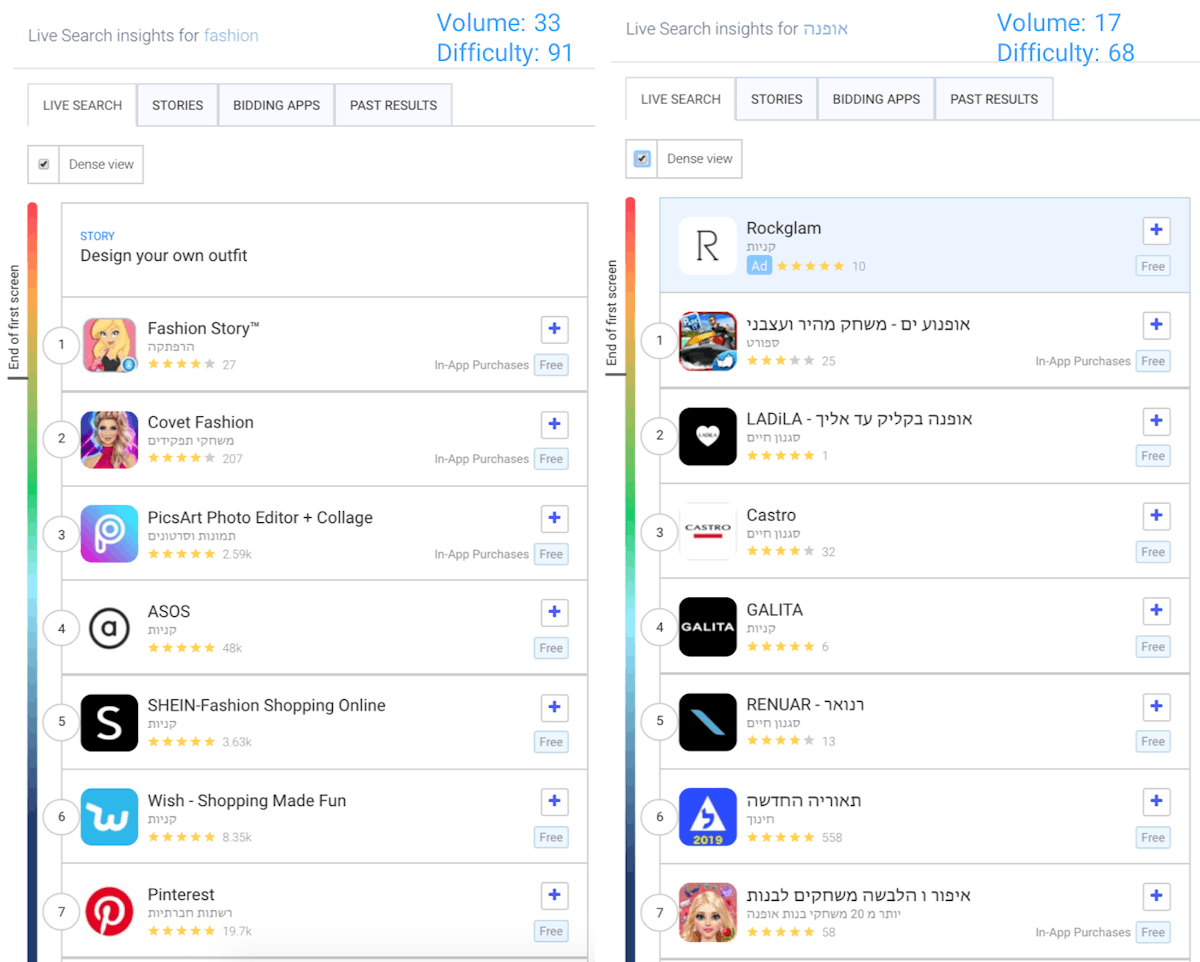
Live Search results for “fashion” vs. “אופנה” in Israel App Store.
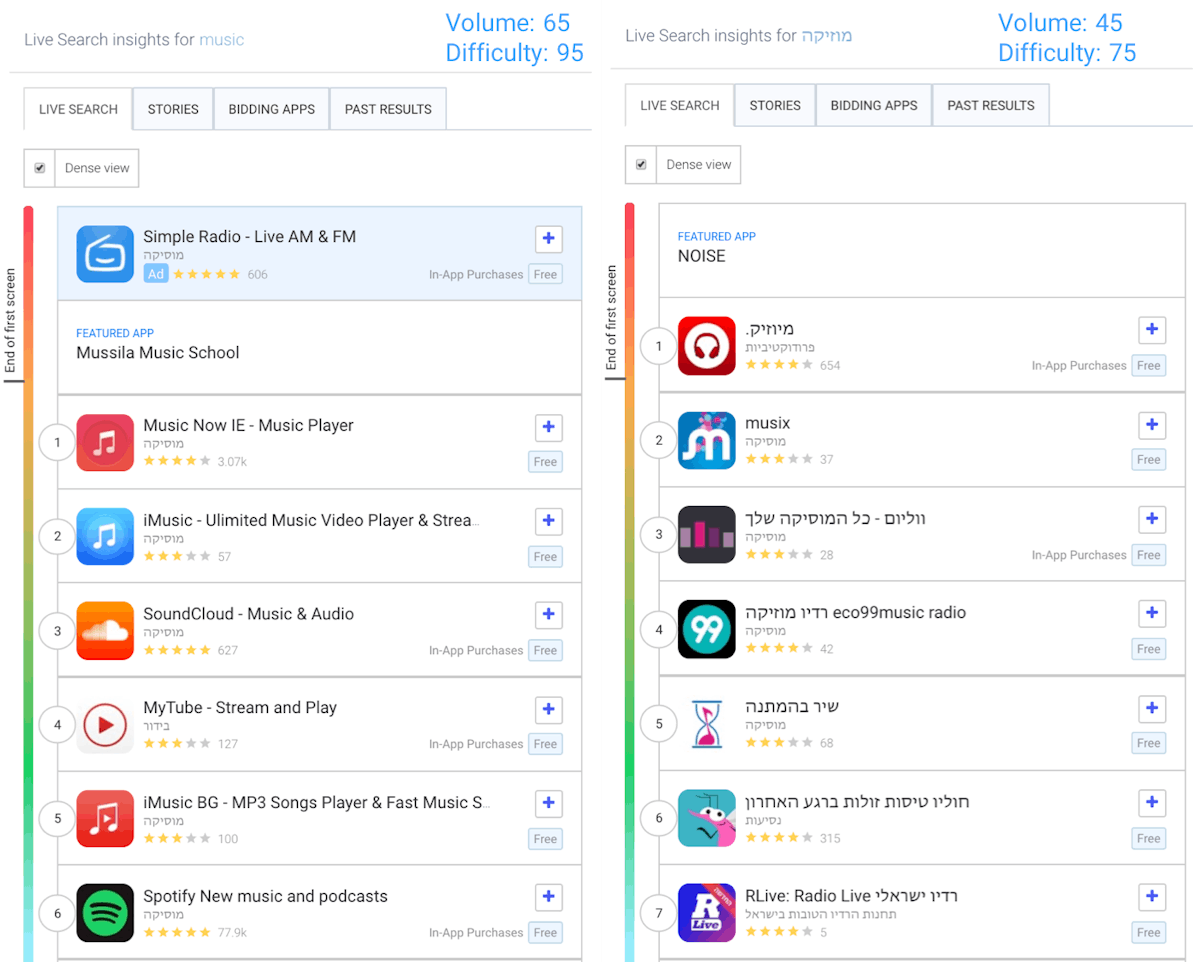
Live Search results for “music” vs. “מוזיקה” in Israel App Store.
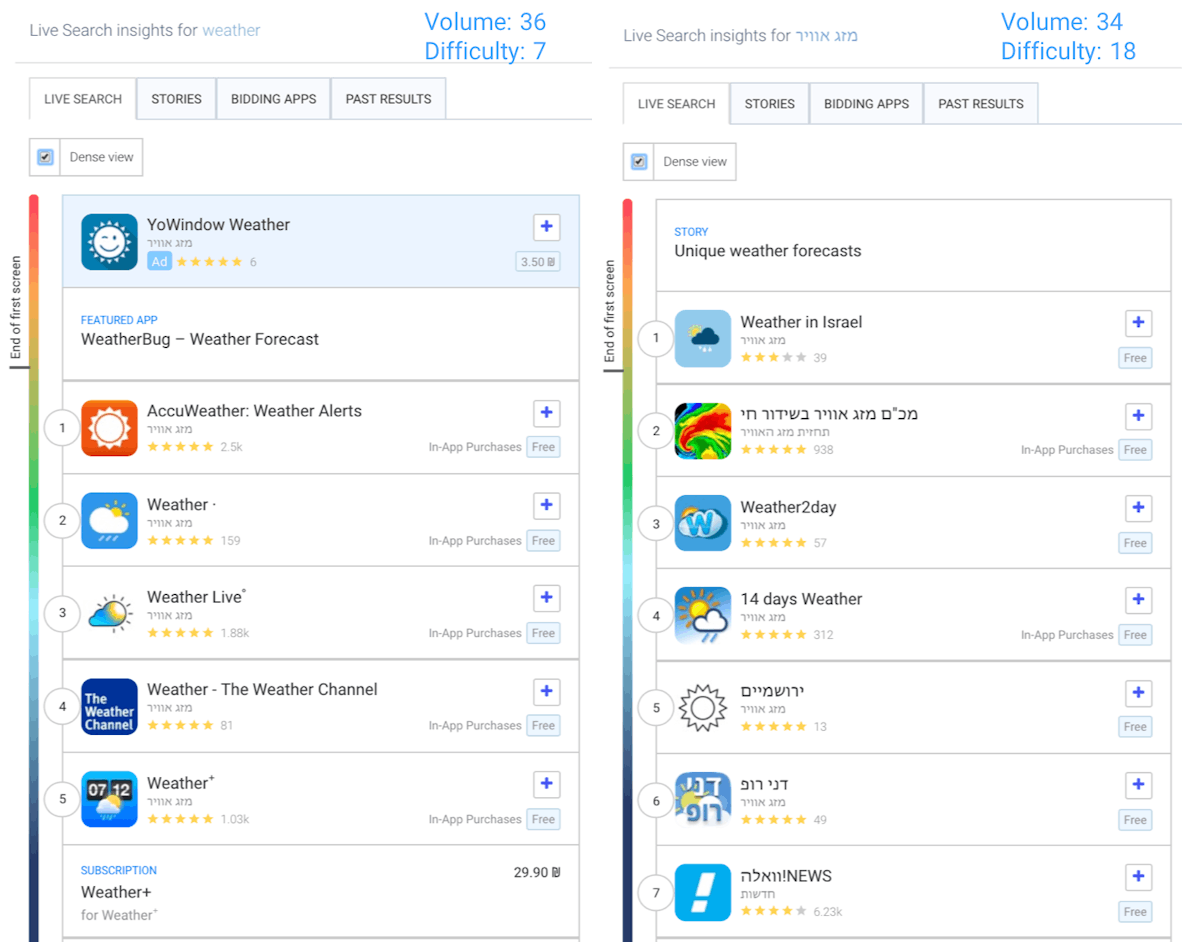
Live Search results for “weather” vs. “מזג אוויר” in Israel App Store.
When we look at these 3 examples, we see that the top search results on the English and Hebrew keyword are totally different. The first tend to be more international apps, whether the latter are more local apps.
It’s interesting to see that in most cases, the volume of the English version of a keyword is higher than its translation. This shows that users are used to search keywords in English. However, the volume of their translation is still significant and ranking for these words can drive a whole new traffic to your app.
The difficulty of the translated keywords is generally lower than their English version,. This is probably because the apps that rank in top results of the English keywords are big international apps with very high App Power. For the translated words, the difficulty is lower because the top apps are more local. However, that doesn’t mean these keywords are more easy to rank for, since your app will be competing against local apps. Make sure to carefully localize all the assets of your app, so local users can relate to your app.
We did the same exercise on popular keywords in the United Arab Emirates and found very similar results.
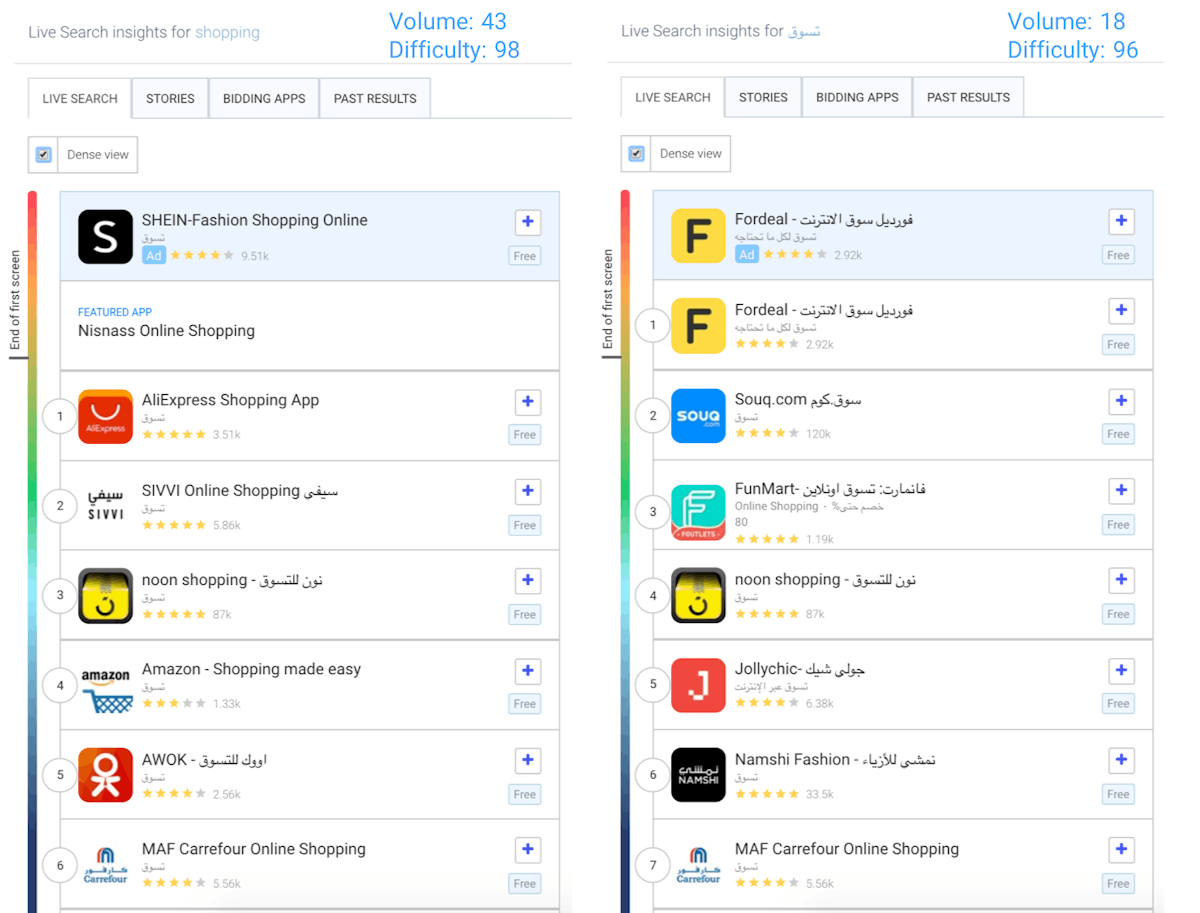
Live Search results for “shopping” vs. “تسوق” in UAE App Store.
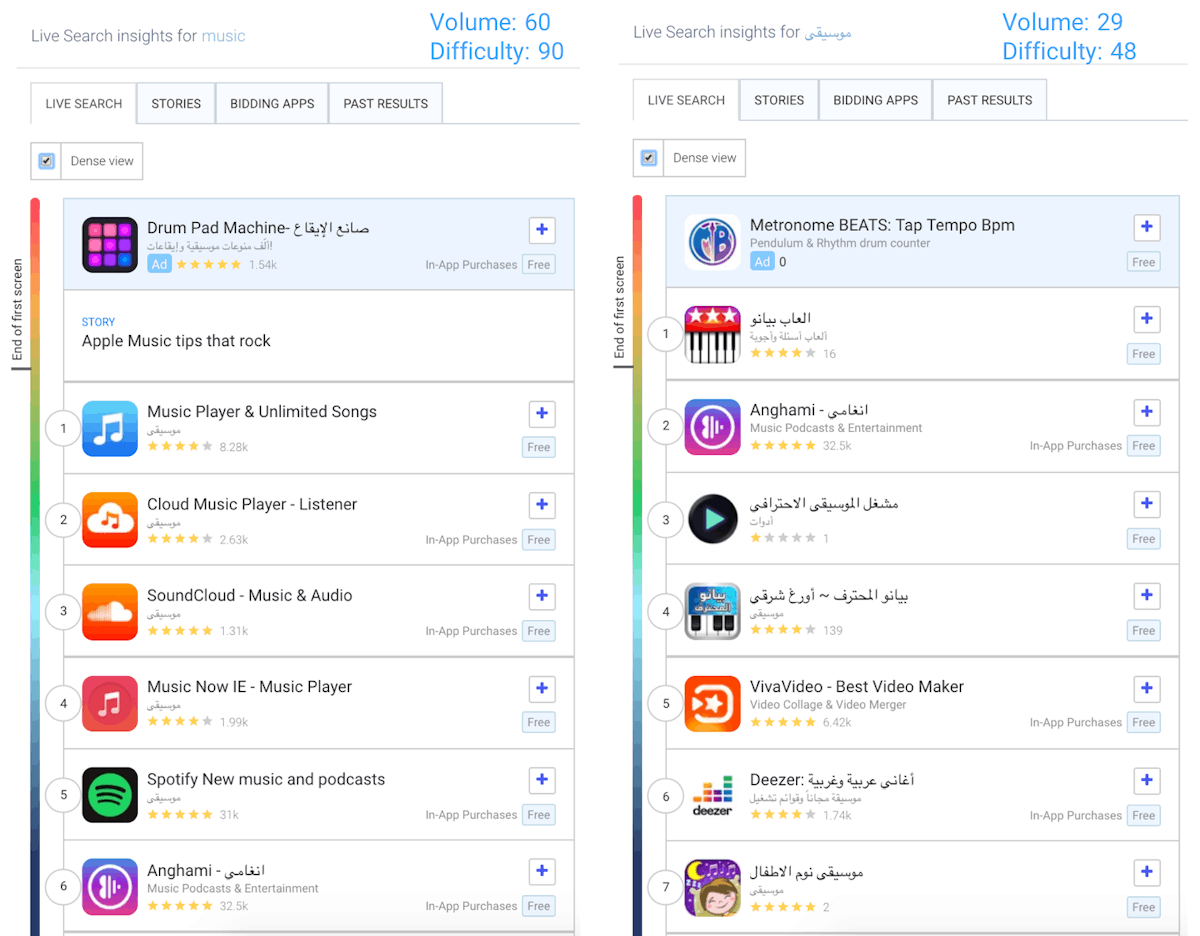
Live Search results for “music” vs. “موسيقى” in UAE App Store.
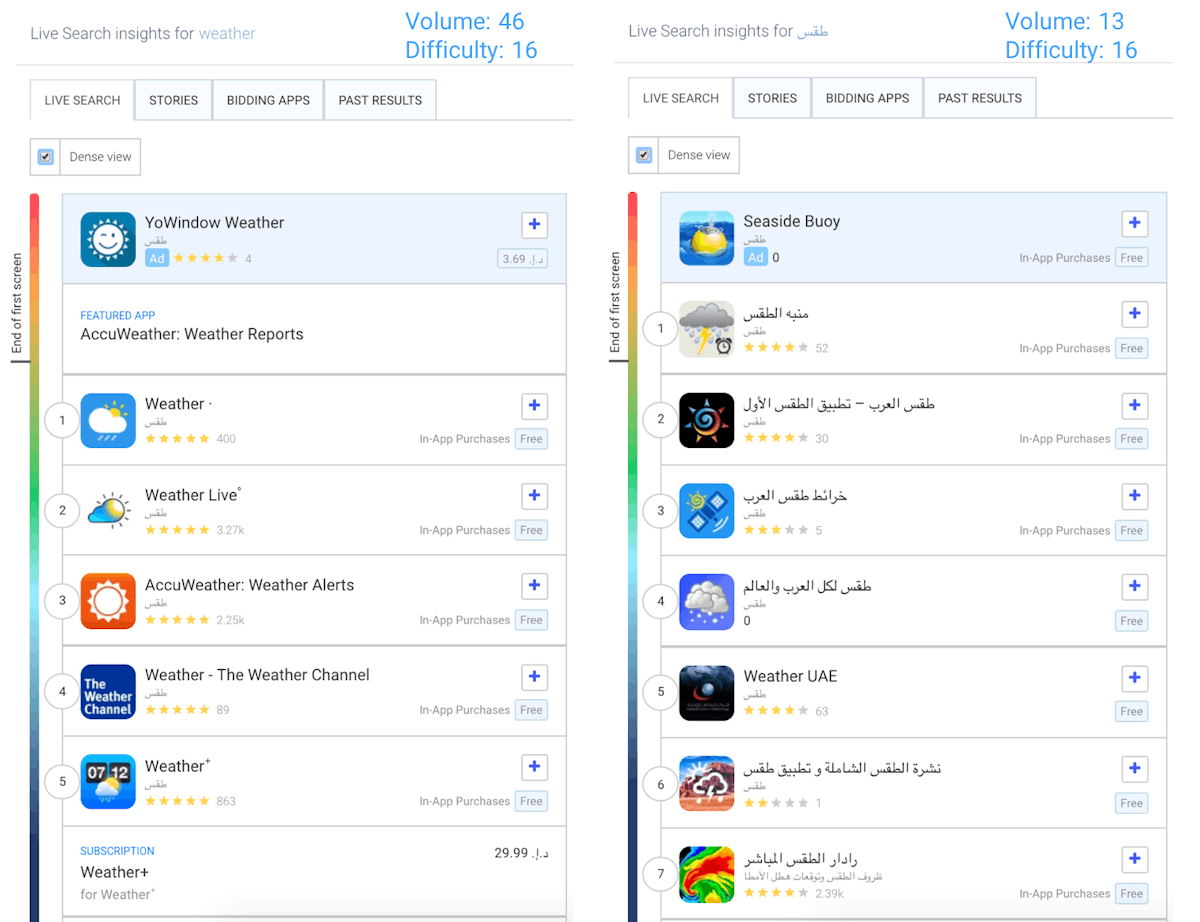
Live Search results for “weather” vs. “طقس” in UAE App Store.
Here again, we see that the top results are totally different. For example, Deezer doesn’t rank on top results of “music” but ranks in the top ten of موسيقى , it’s Arabic translation. Amazon Shopping ranks in top results of “shopping” but not on تسوق , leaving the opportunity for other localized apps. When it comes to the keyword “weather,” not one app ranks in top 10 for both the English and Arabic keyword!
If we compare the keyword stats, we find that English keywords are still very popular in Arabic countries. However, the difficulty of keywords have similar levels, which means that local apps are just as powerful as international apps and difficult to compete against.
We hope these insights will convince you to localize your app in the Arabic countries and in Israel, most especially if these are important markets for your app. If you’re not familiar with Arabic and Hebrew, our keyword suggestions and auto-translation feature will help you get started!

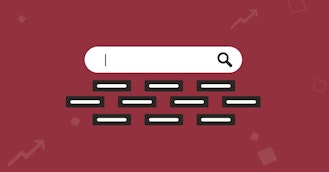

 Lina Danilchik
Lina Danilchik

 Elizabeth Devine
Elizabeth Devine

 Ian Pernia
Ian Pernia